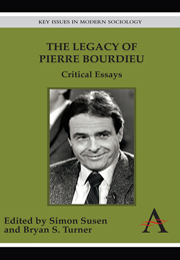Book contents
- Frontmatter
- Contents
- List of Contributors
- Introduction: Preliminary Reflections on the Legacy of Pierre Bourdieu
- 1 Between Structuralism and Theory of Practice: The Cultural Sociology of Pierre Bourdieu
- 2 Pierre Bourdieu: Unorthodox Marxist?
- 3 From Marx to Bourdieu: The Limits of the Structuralism of Practice
- 4 Durkheim and Bourdieu: The Common Plinth and its Cracks
- 5 With Weber Against Weber: In Conversation With Pierre Bourdieu
- 6 Bourdieu and Nietzsche: Taste as a Struggle
- 7 Elias and Bourdieu
- 8 Bourdieu and Adorno on the Transformation of Culture in Modern Society: Towards a Critical Theory of Cultural Production
- 9 The Grammar of an Ambivalence: On the Legacy of Pierre Bourdieu in the Critical Theory of Axel Honneth
- 10 Pierre Bourdieu and the Sociology of Religion
- 11 Bourdieu's Sociological Fiction: A Phenomenological Reading of Habitus
- 12 Overcoming Semiotic Structuralism: Language and Habitus in Bourdieu
- 13 Social Theory and Politics: Aron, Bourdieu and Passeron, and the Events of May 1968
- 14 Intellectual Critique and the Public Sphere: Between the Corporatism of the Universal and the Realpolitik of Reason
- 15 Practice as Temporalisation: Bourdieu and Economic Crisis
- Afterword: Concluding Reflections on the Legacy of Pierre Bourdieu
- Index of Names
- Index of Subjects
- Plate section
13 - Social Theory and Politics: Aron, Bourdieu and Passeron, and the Events of May 1968
Published online by Cambridge University Press: 05 March 2012
- Frontmatter
- Contents
- List of Contributors
- Introduction: Preliminary Reflections on the Legacy of Pierre Bourdieu
- 1 Between Structuralism and Theory of Practice: The Cultural Sociology of Pierre Bourdieu
- 2 Pierre Bourdieu: Unorthodox Marxist?
- 3 From Marx to Bourdieu: The Limits of the Structuralism of Practice
- 4 Durkheim and Bourdieu: The Common Plinth and its Cracks
- 5 With Weber Against Weber: In Conversation With Pierre Bourdieu
- 6 Bourdieu and Nietzsche: Taste as a Struggle
- 7 Elias and Bourdieu
- 8 Bourdieu and Adorno on the Transformation of Culture in Modern Society: Towards a Critical Theory of Cultural Production
- 9 The Grammar of an Ambivalence: On the Legacy of Pierre Bourdieu in the Critical Theory of Axel Honneth
- 10 Pierre Bourdieu and the Sociology of Religion
- 11 Bourdieu's Sociological Fiction: A Phenomenological Reading of Habitus
- 12 Overcoming Semiotic Structuralism: Language and Habitus in Bourdieu
- 13 Social Theory and Politics: Aron, Bourdieu and Passeron, and the Events of May 1968
- 14 Intellectual Critique and the Public Sphere: Between the Corporatism of the Universal and the Realpolitik of Reason
- 15 Practice as Temporalisation: Bourdieu and Economic Crisis
- Afterword: Concluding Reflections on the Legacy of Pierre Bourdieu
- Index of Names
- Index of Subjects
- Plate section
Summary
The purpose of this contribution is to explore historically the relationship between the social theory emerging at the Centre de sociologie européenne in Paris during the 1960s and the Parisian events of May 1968. Adopting the terminology of an article of 1981 by Pierre Bourdieu himself (‘Décrire et prescrire. Note sur les conditions de possibilité et les limites de l'efficacité politique’ [‘Describing and Prescribing. A Note on the Conditions of Possibility and the Limits of Political Effectiveness’] (Bourdieu, 1981), my purpose is to consider in what ways the work of the Centre de sociologie européenne could be said to describe or prescribe the May ‘events’. This consideration is a vehicle for an assessment of the diverging positions of Aron, Bourdieu and Passeron at the time, particularly by reference to their responses to the work of Weber.
The Centre de sociologie européenne was established by Raymond Aron in 1960. I shall explore the development of Aron's view of sociology in the context of his prior commitment to engaged historical observation and then consider his influence on Bourdieu and Passeron. My purpose is to ask what it meant (and might still mean) to regard objective phenomena or events as either social or political.
Mise-En-Scène
Raymond Aron was born in 1905 and was one of a famous cohort of entrants to the École normale supérieure in 1924, which also included Jean-Paul Sartre. His training was predominantly philosophical. In 1930, he obtained a post as Teaching Assistant at the University of Cologne.
- Type
- Chapter
- Information
- The Legacy of Pierre BourdieuCritical Essays, pp. 301 - 328Publisher: Anthem PressPrint publication year: 2011
- 2
- Cited by



